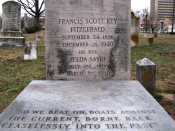Titular and Non-Titular Characters of The Great GatsbyIn the book, The Great Gatsby by F. Scott Fitzgerald, a non-titular character Tom Buchanan is a non-titular character who attempts to thwart the dream of the titular character Jay Gatsby, to be with Daisy Buchanan romantically. Jay Gatsby built his life, his wealth and popularity, all in an attempt gain the love and admiration of Daisy Buchanan. When Daisy and GatsbyÃÂs love is confronted, her husband Tom becomes paranoid and over protective. In the end Gatsby does not end up with Daisy, and Tom is arguably to blame.
Gatsby loves Daisy. ÃÂGatsby bought that house so that Daisy would be just across the way.ÃÂ (Fitzgerald, 72). ItÃÂs obvious to Nick as the book proceeds that Gatsby built his fortune and social status just to win her love. He sees her as a perfect, beautiful being. Ironic in the end as sheÃÂs flawed, Daisy is shallow, depressed, and a gold digger.
The two had been in love earlier in life, when Gatsby was in the military. When he left her for military matters, he dedicated himself to re-experiencing the love they once had. ÃÂ...CanÃÂt repeat the past?ÃÂ he (Gatsby) cried incredulously. ÃÂWhy of course you can!...ÃÂ (Fitzgerald, 99)Tom is DaisyÃÂs husband. He is a racist, arrogant, morally faulty, non-titulay character whoÃÂs affair with another non-titular woman, Myrtle, draws no moral guilt. But when he learns of his wifeÃÂs past love with the new guy in town, Gatsby, he becomes jealous and protective. ÃÂ...IÃÂd like to know who he is and what he does,ÃÂ insisted Tom, ÃÂand I think IÃÂll make a point of finding out...ÃÂ He begins to follow Daisy around at parties to satisfy his own paranoia, blocking any possible connections between Daisy and Gatsby.
Eventually, the two, Daisy and Gatsby, do not end up together. Gatsby is paranoid for Daisy, and waits outside her house numerous nights to be sure Tom does not hurt her. GatsbyÃÂs adoration for Daisy is admirable, but he dies ironically by WilsonÃÂs hand when he thinks he killed Myrtle and they had been lovers. His life is in vain, likely a metaphor for the inevitability of dedicating a life to a hollow love.
Fitzgerald, F. Scott. The Great Gatsby. New York: Charles Scribner's Sons, 1925.





